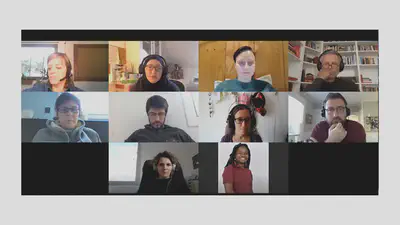First Meeting of the International Committee on Open Phytolith Science

The International Committee on Open Phytolith Science (ICOPS) has been created within the International Phytolith Society to work on increasing the knowledge of and implementation of open science practices in phytolith research.
The first committee meeting took place on 3rd December 2021. We have 11 committee members who come from all over the world.
The committee members are (in alphabetical order):
- Doris Barboni (CEREGE, France)
- Jennifer Bates (Seoul National University, South Korea)
- Abraham Dabengwa (University of the Witwatersrand, South Africa)
- Zach Dunseth (Brown University, USA)
- Juan José García-Granero (Spanish National Research Council, Spain)
- Emma Karoune (Chair, The Alan Turing Institute, UK)
- Celine Kerfant (Universitat Pompeu Fabra, Spain)
- Carla Lancelotti (Universitat Pompeu Fabra, Spain)
- Marco Madella (Universitat Pompeu Fabra, Spain)
- Maria Gabriela Musaubach (National University of Jujuy and Institute of Andean Ecoregions (CONICET-UNJu), Argentina)
- Javier Ruiz-Pérez (Texas A&M University, USA)
Open Science is an approach that aims to transform research by making it more reproducible, transparent, reusable, collaborative, accountable and accessible to society. Open Science emcompasses many different practices such as open data, open methods, open source software, open hardware, open access publishing, citizen science, open educational resources and equity, diversity and inclusion.
This new committee therefore embraces these practices in its own work and strives to make everything that it does open and transparent to the phytolith community. We aim to engage with the phytolith community regularly from the very start and we encourage phytolith researchers to get involved in the training, seminars, discussions and working initiatives that we will be doing.
We will be using several different communication methods including the IPS blog and forum, Facebook (International Committee on Open Phytolith Science), Twitter (@open_phytoliths), Instagram (@open_phytoliths) and we will also establish a Slack workspace.
We currently have one active project, the FAIR Phytoliths project, that is working to improve data sharing by investigating existing phytolith data and drawing up guidelines for the implementation of the FAIR principles for existing and future phytolith data.
We will also be helping with the special issue on Phytoliths in Asia for the journal Review of Palaeobotany and Palynology. This will be the first of its kind to ask authors to comply with good open science practices for all of the submissions and we will offer guidelines about this best practice to assist authors.
We will start to run community meet-ups in the new year that will include talks and training on different open science practices, so please look out for information about these events.
We look forward to working with you all,
The International Committee for Open Phytolith Science
Doris Barboni, Jennifer Bates, Abraham Dabengwa, Zachary C. Dunseth, Juan José García-Granero, Emma Karoune, Celine Kerfant, Carla Lancelotti, Marco Madella, Maria Gabriela Musaubach, Javier Ruiz-Pérez.